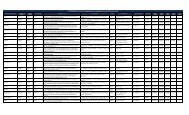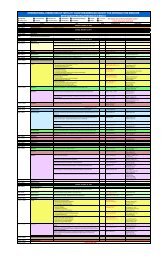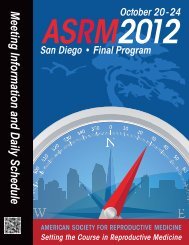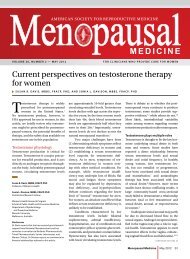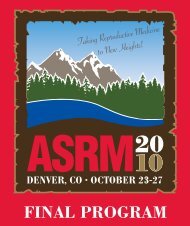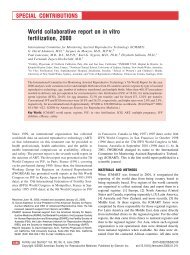scientific program • symposia - American Society for Reproductive ...
scientific program • symposia - American Society for Reproductive ...
scientific program • symposia - American Society for Reproductive ...
Create successful ePaper yourself
Turn your PDF publications into a flip-book with our unique Google optimized e-Paper software.
SCIENTIFIC PROGRAM <strong>•</strong> INTERACTIVE SESSIONS<br />
Monday, October 17, 2011 1:15 pm – 2:15 pm<br />
Meet the Director<br />
NICHD: YOUR CHANCE TO MEET THE DIRECTOR<br />
Louis V. DePaolo, Ph.D. (Chair)<br />
Eunice Kennedy Shriver National Institute of Child Health and Human<br />
Development<br />
Alan E. Guttmacher, M.D.<br />
National Institute of Child Health and Human Development<br />
Monday, October 17, 2011 1:15 pm – 2:15 pm<br />
Menopause Day Luncheon Interactive Session (Ticketed)<br />
MENOPAUSAL ANDROGEN REPLACEMENT: A GLOBAL VIEW<br />
Joint Session presented by the Menopause Special Interest Group and the<br />
International Menopause <strong>Society</strong><br />
John E. Buster, M.D. (Chair)<br />
Women and Infants Hospital<br />
Nicholas Panay, B.Sc., M.B.B.S.<br />
Imperial College Healthcare NHS Trust<br />
Bruce R. Carr, M.D.<br />
University of Texas Southwestern Medical Center<br />
Needs Assessment and Description<br />
Most physicians consider menopausal decreased sexual<br />
desire (Hypoactive Sexual Desire Disorder, [HSDD] ICD#<br />
799.81) to be intractable and difficult to treat. In their<br />
practices, they avoid asking about this problem. Few<br />
physicians are trained to identify and manage declining<br />
sexual desire in aging women. They do not understand its<br />
link to mood elevating drugs and decreasing androgen<br />
production, nor appreciate the adverse psychological<br />
impact and dysfunctional effects on partners and families.<br />
This presentation, directed to physicians and allied health<br />
practitioners who care <strong>for</strong> aging women, reviews recent<br />
knowledge and innovation on the endocrinology of HSDD<br />
and its treatment. The presentation fills this knowledge gap<br />
and will significantly enhance the skills of learners to care <strong>for</strong><br />
this very common and neglected problem.<br />
Learning Objectives<br />
At the conclusion of this session, participants should be able<br />
to:<br />
1. Describe the endocrinology and pathophysiology of<br />
HSDD at it relates to woman’s aging, genetics, declining<br />
androgen production, and linkages to other disorders of<br />
sexual functioning.<br />
Room 240 A/B<br />
Room 230 A/B<br />
83<br />
ACGME COMPETENCY<br />
Systems-based Practice<br />
2. Identify and manage drugs associated with HSDD in both<br />
women and men.<br />
3. Manage administration of transdermal estradiol and<br />
testosterone in the managment of HSDD.<br />
ACGME COMPETENCY<br />
Medical Knowledge<br />
Patient Care<br />
TEST QUESTION:<br />
After participating in this session, I will do the following in my<br />
practice:<br />
A. Do not ask about sexual desire in postmenopausal<br />
women who have undergone oophorectomy.<br />
B. Prescribe SSRI medications to postmenopausal women<br />
who are depressed over declining sexual desire.<br />
C. Prescribe vaginal estradiol, transdermal estradiol and<br />
transdermal testosterone to a 50-year-old<br />
oophorectomized woman who is complaining of lost<br />
sexual desire.<br />
D. Prescribe oral estradiol and methyltesterone to a woman<br />
who underwent oophorectomy and suffered a postoperative<br />
episode of deep vein thrombosis.<br />
E. Prescribe oral conjugated estrogens to postmenopausal<br />
women as first choice <strong>for</strong> decreased sexual desire.<br />
F. Not applicable to my area of practice.



